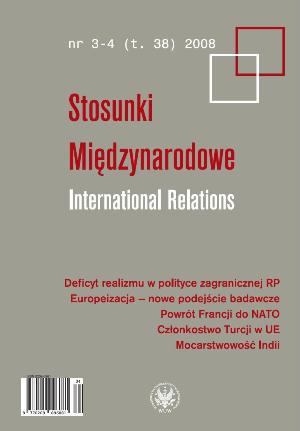INDIE – „WSCHODZĄCE” MOCARSTWO XXI WIEKU
India – an emerging power in the 21st century
Author(s): Jakub ZajączkowskiSubject(s): Politics / Political Sciences
Published by: Wydawnictwa Uniwersytetu Warszawskiego
Keywords: Indie; zimna wojna; rozwój; mocarstwo; Azja; przyczyny
Summary/Abstract: Thanks to its economic reforms, modernized army, developing nuclear programme and geopolitical situation following the end of the Cold War, India can already be considered an emerging power in the 21st century. The end of the Cold War and the collapse of the Soviet Union altered the balance of power in international relations. Internal circumstances (the growth of Hindu nationalism, transformation of political party system) as well as external ones (rivalry with China and Pakistan, the aftermath of September 11, 2001) have influenced the evolution of Indian post- Cold War strategic thought. India has moved away from the Nehruvian tradition of non-alignment and moralizing in international relations, towards a pragmatic policy. One of its main objectives was to settle its relations with the world’s major powers, especially with the only super-power – the USA, with Russia (its chief weapons supplier), and with China (its main, longtime adversary in Asia). The normalization of relationsare and an increase in trade with Beijing and Washington, are proof of India’s stronger position in the international arena. Moreover, following the end of the Cold War, it became necessary to redefine the principles, on which India’s role in the sub-region of South Asia was based. In the early 1990s, the government in New Delhi set out to improve relations, or to establish friendly relations with its direct neighbours. During a period of 15 years, India – thanks mainly to the economization of its foreign policy, its multilateralism and new directions of activity – managed to win over a growing number of countries to its aspirations. However, this does not change the fact that India still faces considerable challenges and constraints. They are connected with both internal (economic, cultural) and international (global, regional) factors, which adversely affect India’s position on the international stage. There is a need for greater coherence in foreign policy, a more active policy towards developing countries, integration with the world economy, and closer relations with countries of the Asia-Pacific region (which can be achieved by joining APEC). India’s foreign policy must be active and multilateral, and it should encompass instruments of trade policy. Furthermore, if India is to play an increasingly important role in the world, it must carry out necessary internal reforms, mainly in the fields of education and the economy. Fulfilling these conditions, especially the latter two, can determine if India will still be called a potential power, an emerging power, or as some describe it, a power that is “always emerging but never quite arriving”. Improving the efficiency of the economy, further liberalization, increasing investment, better access to education – these factorswill certainly contribute to advancing India’s position, and they will also force its critics to acknowledge India’s major-power status.
Journal: Stosunki Międzynarodowe
- Issue Year: 38/2008
- Issue No: 3-4
- Page Range: 107-124
- Page Count: 18
- Language: Polish

